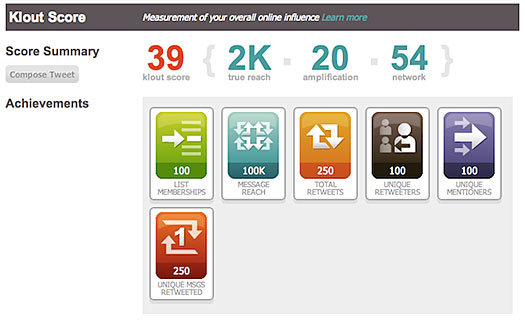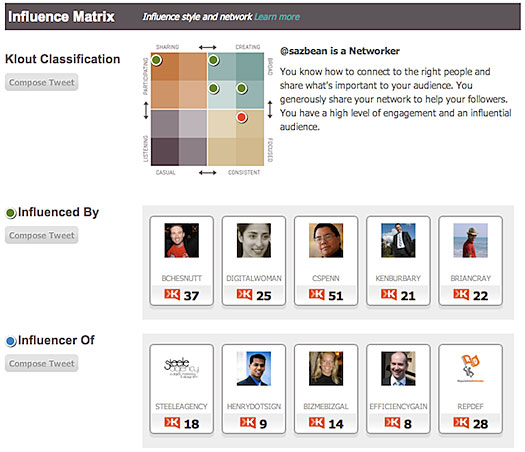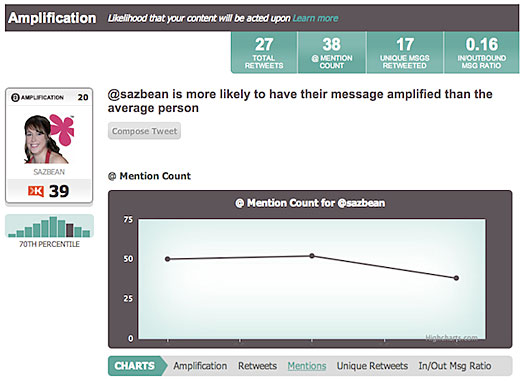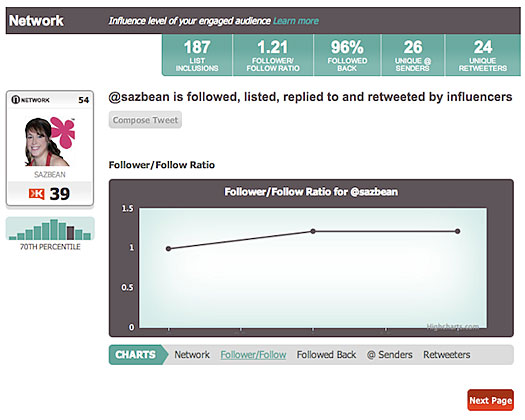
Guest post by Sarah Worsham
Sazbean
Klout is a measurement tool that gives an idea of your social web influence with Twitter. Their data is used by applications such as Co-Tweet, HootSuite and others.
Like Twitalyzer, Klout measures various aspects of Twitter usage and network, but focuses more on how influence and messages are spread via your network. Just because you have a lot of followers doesn’t mean that all of them are actually listening and engaging with you (and they probably aren’t). Klout gives you an idea of what your actual reach is and how engaged you are with your network, and vice versa.
 When you first sign up with Klout, you’ll be asked to connect with your Twitter and Facebook accounts (not sure what they do with the Facebook information, but I’ve since disconnected that to see what the impact is). You’ll be given an initial score, but Klout takes a bit of time to chug through all your data to give you an actual score a bit later. It takes up to a few hours – they’ll email you.
When you first sign up with Klout, you’ll be asked to connect with your Twitter and Facebook accounts (not sure what they do with the Facebook information, but I’ve since disconnected that to see what the impact is). You’ll be given an initial score, but Klout takes a bit of time to chug through all your data to give you an actual score a bit later. It takes up to a few hours – they’ll email you.
I’m not sure if this process is really clear. I was a bit surprised to get an email later saying that my Klout score had been calculated; since it seemed like it already had. Another surprise is that your initial Klout score will probably be higher than your actual one, since they have to take some time to process all the data. I think this is confusing: They need to make it really clear that the initial score is just that. Maybe even just show some of the results with a clear message.
Klout score
Klout takes all the data they’ve processes and gives you a Klout score, based on actual reach and engagement and influence of your followers and network. They also award you achievements – but what achievements are possible to get isn’t clear (seems like you’d like people to know what’s possible so they can strive toward them). See image at top.
Influence Matrix
Next your network is broken down into your top 5 influencers and influencees (although this probably will change with time and is probably based on last so many tweets). From these people (who you also can see a score for), they give you an idea of what type of influencer you are, as well as what type of influencer your top 5 influencers are.
Interesting information, but if you’re actually engaged in your network you probably won’t be surprised by this. After I saw the Klout scores for my influencers, it helped put my own score into perspective. As an aside, I think there are probably people in my network who I’m more influenced by, which is why I think Klout used the last so many tweets. I would also expect this to change with time. Interestingly, the people in the list of influenced by me changed from the initial Klout score to the actual.

There’s also a content analysis of the top 5 or so of most influential topics which you cover. It would be interesting to see this divided up by what topics you’re influenced by and what topics you have influence in to see how you’re sending messages through your network.
Score analysis
Klout breaks down your score further, into True Reach, Amplification and Network to give you an idea of how they calculated the score and where you have influence. Of this information, I found Amplification & Network to be the most useful.
Amplification gives you an idea of the likelihood that your tweets will generate retweets and conversation.

Network gives you an idea of how well your network is working for you and also places where you can improve.

Content analysis
I didn’t find the content analysis as useful. I think there’s better information available in HootSuite about what tweets are getting the most attention and clicks. Also, the click analysis showed 0 clicks for all the tweets they pulled, which leaves me to believe that they don’t have the ability to collect information for my tweets since I use ow.ly. Which also makes you wonder how this affects their analysis.
Overall
Klout gives some good information about how well your network is working towards amplifying your message, as well as how engaged you are with your network. I think they could be more clear about the initial Klout score and the actual Klout score and the fact that it takes them some time to come back with an actual score. With 0 clicks showing for all the tweets they pulled, I’m suspicious of how well they measure that aspect of their score (at least with my account), which makes me wonder what my score would be if I did use bit.ly. As difficult as it is to integrate with different services across the Internet, they need to make these shortcomings clear or at least explain what’s going on. Klout does give more information on how they calculate the various aspects of their score here.
Klout seems to be useful for looking for trends in your influence (and as a benchmark). As long as you don’t change anything in regards to the way they measure (like switching to bit.ly from ow.ly URL shortener), you should be able to get some good information on how your influence is changing. There’s also some nice tidbits of information about your network.
As with all metrics and measurement tools, use Klout as a tool to give you more information about what’s going on in your social web. I’d recommend using it in conjunction with other tools (like HootSuite & Twitalyzer) to get a clearer picture of your Twitter network. Twitalyzer gives nice recommendations of places where you might want to improve. Some of this information is also available in Klout, but you have to dig a bit deeper (eg., in image mouse-overs).
What do you think? Have you tried Klout?
Related
• 14 free tools to measure your social influence (Socialbrite)
 This work is licensed under a Creative Commons Attribution-NonCommercial 3.0 Unported.
This work is licensed under a Creative Commons Attribution-NonCommercial 3.0 Unported.









Yes, I found it through Hootsuite, and then found out more about it. I like to use it to find new followers, and see what my friends and followers are doing and what type of bird they are. I find it useful. I'm a pay-customer at Hootsutie, I hope they don't start charging for Klout too. :)